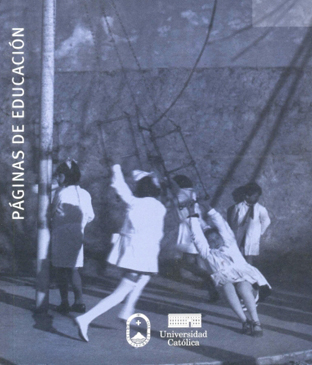Knowledge mobilization in education. Connection between the research, the policy and practice: a theoretical approach
DOI:
https://doi.org/10.22235/pe.v10i1.1362Keywords:
knowledge mobilization, knowlegde, universities, dissemination of knowledgeAbstract
This article analyzes the concept of knowledge mobilization from its importance as a novel term in the contemporary educational context. The ways in which knowledge is transmitted to the educational community generated the emergence of a growing line of research that analyzes how these knowledges are mobilized from universities and research centers to educational agents and society. Through an exhaustive theoretical review, this paper presents the fundamentals of the concept, describes empirical studies that address it and mentions the suggestions that researchers of the subject themselves made to improve the impact of the mobilization of knowledge in the educational reality.
Downloads
References
Arsenijević, J. (2001). Methodology for assessment of knowledge management in higher education institutions. African Journal of Business Management, 5(8), 3168-3178.
Cooper, A. (octubre, 2010). Knowledge mobilization intermediaries in education. Comunicación presentada en la 39ª Annual Canadian Society for the Study of Education Conference, Montreal, Canadá.
Cooper, A. (2012). Knowledge mobilization intermediaries in education: A cross-case analysis of 44 Canadian organizations (Tesis doctoral). Universidad de Toronto, Toronto, Canadá.
Cooper, A., y Levin, B. (2010). Some Canadian contributions to understanding knowledge mobilization. Evidence & Policy: A Journal of Research, Debate and Practice, 6(3), 351-369.
Cooper, A., Levin, B., y Campbell, C. (2009). The growing (but still limited) importance of evidence in education policy and practice. Journal of Educational Change, 10(2-3), 159-171.
Cooper, A., Rodway-Macri, J., y Read, R. (setiembre, 2011). Knowledge mobilization practices of educational researchers in Canada. Comunicación presentada en el American Educational Research Association, New Orleans, Estados Unidos.
Davenport, T., y Prusak, L. (2001). Conocimiento en acción como las organizaciones manejan lo que saben. Buenos Aires, Argentina: Pearson Education.
Feldman, P., Nadash, P., y Gursen, M. (2001). Improving communication between researchers and policy makers in long-term care or, researchers are from Mars; policy makers are from Venus. The Gerontologist, 4(3), 312-321.
Fenwick, T., y Farrell, L. (2011). Knowledge mobilization and educational research: politics, languages and responsibilities. Nueva York, NY: Routledge.
Gaudet, J. (2013). It takes two to tango: knowledge mobilization and ignorance mobilization in science research and innovation. Prometheus, 31(3), 169-187.
Honig, M.I. (2004). The new middle management: Intermediary organizations in education policy implementation. Educational Evaluation and Policy Analysis, 26(1), 65-87.
Levin, B. (2004). Making research matter more. Education Policy Analysis Archives, 12(56), 1-20.
Levin, B. (mayo, 2008). Thinking about knowledge mobilization. Paper presentado en el Canadian Council on Learning y The Social Sciences and Humanities Research Council, Toronto, Canadá.
Levin, B. (2011). Mobilizing research knowledge in education. London Review of Education, 9(1), 15-26.
Levin, B. (2013). To know is not enough: Research knowledge and its use. Review of Education, 1(1) 2-31.
Levin, J., y O'Donnell, A. (1999). What to do about educational research's credibility gaps? Issues in Education 5(2), 177-229.
Moss, G. (2013). Research, policy and knowledge flows in education:
what counts in knowledge mobilization? Contemporary Social Science, 8(3), 237-248.
Nonaka, I., Sasaki, K., y Ahmed, M. (2001). Knowlogde creation. The power of tacit knowlodge. Knowledge Management Magazine, 10, 10-15.
Nonaka, I., y Takeuchi, H. (1995). The Knowledge-creating company. How japanese companies create the dynamics of innovation. New York, NY: Oxford University Press.
O'Dell, C. (2001). El valor de la gestión del conocimiento. Harvard Deusto Márketing y Ventas, 46, 18-20.
Qi, J., y Levin, B. (2013). Assessing Organizational Efforts to Mobilize Research Knowledge in Education. Education Policy Analysis Archives, 2(2), 18-31.
Sá, C., Li, S., y Faubert, B. (2011). Faculties of education and institutional strategies for knowledge mobilization: an exploratory study. Higher Education, 61(4), 501-512.
Thompson, G., Estabrooks, C., y Degner, L. (2006). Clarifying the concepts in knowledge transfer: a literature review. Journal of Advanced Nursing, 53(6), 691-701.
Ward, V., House, A., y Hamer, S. (2009). Knowledge brokering: the missing link in the evidence to action chain? Evidence & Policy: a Journal of Research, Debate and Practice, 5(3), 267-279.
Ward, V., Smith, S., Foy, R., House, A., y Hamer, S. (2010). Planning for knowledge translation: a researcher's guide. Evidence y Policy: A Journal of Research, Debate and Practice, 6(4), 527-541.















